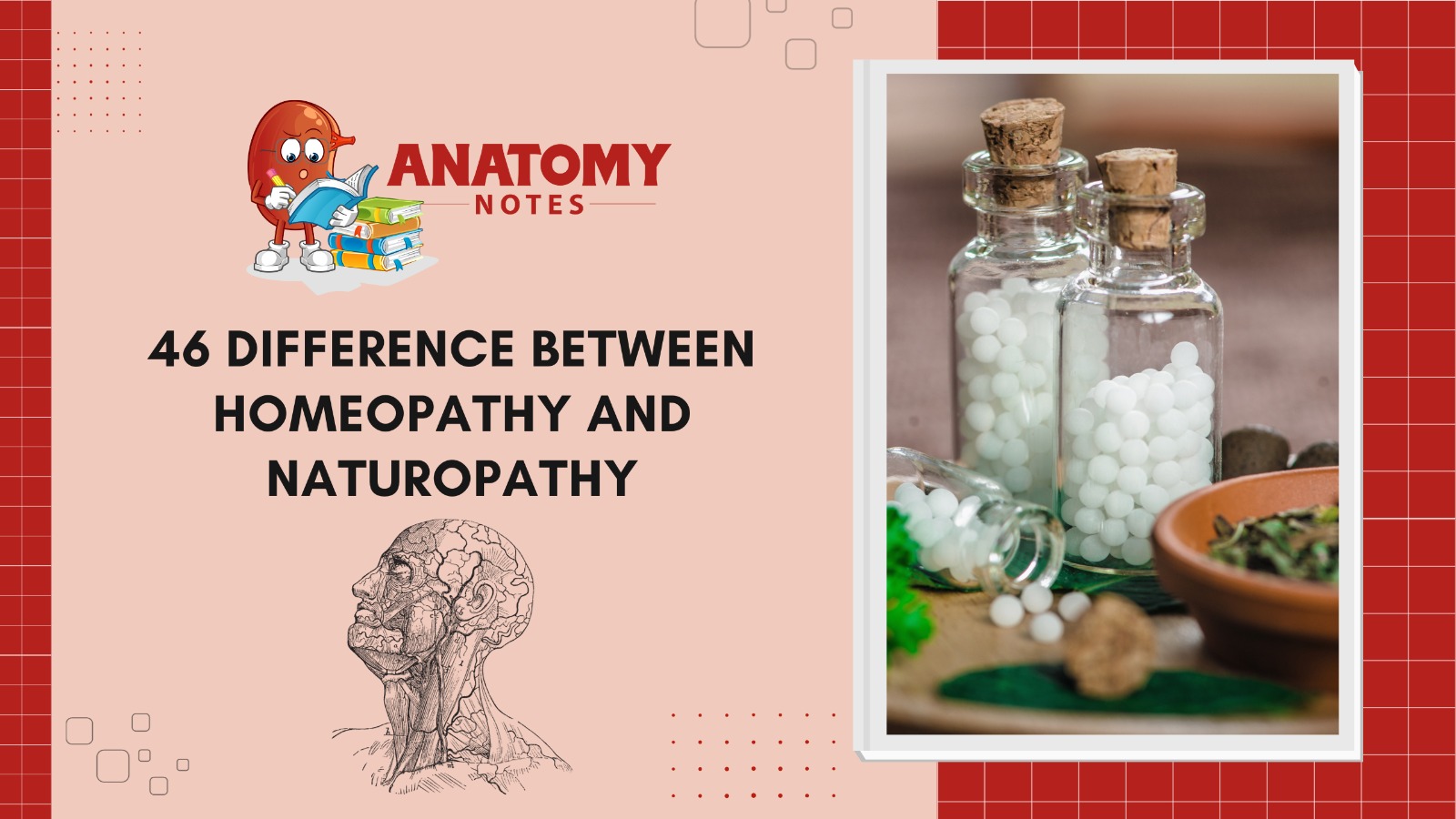Homeopathy and naturopathy emphasize natural therapies and holistic health. However, their ideologies, methodologies, and approaches to treating specific health disorders differ greatly. Samuel Hahnemann invented homeopathy in the late 18th century. It works on the idea of “like cures,” where a chemical that generates symptoms in a healthy person is super-diluted and given to a sick person to encourage self-healing. Highly diluted homeopathic medicines are considered to maintain the original substance’s energy. Treatments are tailored to the patient’s symptoms and constitution.
Naturopathy, on the other hand, attempts to find and treat the causes of sickness. It uses diet, herbal medication, lifestyle counseling, hydrotherapy, and more. Naturopathic doctors promote balance and remove barriers to well-being to help the body recover itself. Personalized treatments include lifestyle modifications, food changes, and natural supplements. Their fundamentals differ greatly. The idea of “vital force,” which homeopathic treatments activate, leads to healing. Naturopathy empowers individuals to manage their health by highlighting the body’s natural healing capabilities.
Preparing medicines is another difference. Some homeopathic treatments are so diluted that few molecules of the original chemical remain. Naturopathic therapies employ herbs, nutrients, and other natural ingredients without severe dilution. Practice scope and training vary between the two ways. Licensed homeopathic practitioners specialize in homeopathic principles and medicines. Naturopathic physicians (NDs) study natural remedies and conventional medicine in authorized medical programs.
Homoeopathy and Naturopathy both use natural means to heal, but their philosophy, treatment methods, and scope of practice differ. Homoeopathy emphasizes “like cures like” and very diluted medicines, whereas Naturopathy promotes holistic health using a variety of natural therapies. The two ways depend on personal choices, health needs, and professional advice.
Also Read: The Top 10 Global Universities for Biology
46 differences between Homeopathy and Naturopathy:
|
S.No. |
Aspects |
Homeopathy |
Naturopathy |
|
1 |
Definition |
A system of alternative medicine based on the principle of “like cures like.” |
A system of alternative medicine that focuses on natural remedies and the body’s self-healing abilities. |
|
|
Philosophy |
Based on the Law of Similars, where a substance that can cause symptoms in a healthy person can cure similar symptoms in a sick person. |
Emphasizes the body’s ability to heal itself through natural therapies and lifestyle changes. |
|
3 |
Remedies |
Uses highly diluted substances, often in the form of tinctures or pellets, to stimulate the body’s vital force. |
Utilizes various natural treatments such as herbal medicine, hydrotherapy, and nutrition. |
|
4 |
Potentization |
Involves a process of serial dilution and succussion (vigorous shaking) to increase the potency of remedies. |
Does not involve the process of potentization. |
|
5 |
Individualization |
Prescribes remedies based on a person’s specific symptoms and constitution. |
Tailor treatments based on an individual’s overall health and lifestyle. |
|
6 |
Treatment Duration |
Can be long-term, with remedies taken over extended periods. |
Treatment duration varies depending on the individual and condition. |
|
7 |
Diagnostic Tools |
Relies on detailed symptom analysis and patient history. |
May use diagnostic tools like blood tests and physical exams. |
|
8 |
Side Effects |
Generally considered safe with minimal to no side effects. |
Natural treatments may have fewer side effects than conventional medicine. |
|
9 |
Scientific Acceptance |
Controversial within the medical community due to the principle of extreme dilution. |
Generally accepted as a holistic and complementary approach. |
|
10 |
Regulation |
Regulated differently in various countries, with varying levels of recognition. |
Naturopathy is regulated in some countries and states. |
|
11 |
Treatment of Acute Illness |
Can be used for acute conditions but is often associated with chronic illnesses. |
Can address both acute and chronic conditions. |
|
12 |
Medicinal Ingredients |
Uses highly diluted substances, often from plants, minerals, or animal sources. |
Utilizes natural substances like herbs, vitamins, and minerals. |
|
13 |
Healing Approach |
Believes in the concept of stimulating the body’s vital force to initiate healing. |
Focuses on removing obstacles to the body’s innate healing abilities. |
|
14 |
Treatment of Mental Health |
May include remedies for mental health conditions. |
May incorporate counseling and lifestyle changes for mental well-being. |
|
15 |
Licensing and Certification |
Practitioners may have certifications in homeopathy but not always required. |
Naturopathic doctors (NDs) require specific licensing and training. |
|
16 |
Evidence-Based Practice |
Limited scientific evidence supports homeopathy’s efficacy. |
Naturopathy has a broader evidence base for many natural therapies. |
|
17 |
Treatment of Infections |
Homeopathy may offer remedies for infectious diseases. |
Naturopathy may recommend natural approaches to support the immune system. |
|
18 |
Detoxification |
May use homeopathic remedies for detoxification purposes. |
Emphasizes detoxification through dietary and lifestyle changes. |
|
19 |
Allergies |
Offers homeopathic remedies for allergies. |
Addresses allergies through dietary modifications and supplements. |
|
20 |
Regulation of Diet |
Homeopathy does not typically provide dietary guidelines. |
Naturopathy often prescribes specific dietary recommendations. |
|
21 |
Exercise Recommendations |
Homeopathy does not typically prescribe exercise routines. |
Naturopathy may recommend exercise as part of a holistic approach. |
|
22 |
Holistic Approach |
Focuses on specific symptomology and individual remedies. |
Takes a holistic approach by addressing multiple aspects of health. |
|
23 |
Belief in Vital Force |
Believes in the concept of vital force or life force. |
Does not rely on the concept of vital force. |
|
24 |
Treatment of Skin Conditions |
May offer homeopathic remedies for skin conditions. |
Addresses skin conditions through natural topical treatments. |
|
25 |
Education and Training |
Homeopaths typically undergo specific training in homeopathy. |
Naturopathic doctors receive comprehensive training in natural medicine. |
|
26 |
Treatment of Chronic Fatigue |
May recommend homeopathic remedies for chronic fatigue. |
Addresses chronic fatigue through lifestyle changes and supplements. |
|
27 |
Symptom Aggravation |
Homeopathy may cause temporary symptom aggravation before improvement. |
Naturopathy aims to minimize symptom aggravation. |
|
28 |
Treatment of Cancer |
Homeopathy may offer supportive care for cancer patients. |
Naturopathy may provide complementary therapies for cancer patients. |
|
29 |
Clinical Trials |
Limited high-quality clinical trials for many homeopathic remedies. |
Naturopathic treatments may have more clinical research support. |
|
30 |
Treatment of Digestive Issues |
May recommend homeopathic remedies for digestive problems. |
Addresses digestive issues with dietary modifications and supplements. |
|
31 |
Placebo Effect |
Some argue that homeopathy’s effects are largely due to the placebo effect. |
Naturopathy aims for genuine therapeutic effects beyond placebo. |
|
32 |
Treatment of Children |
Homeopathy is used for pediatric conditions. |
Naturopaths provide care for children using natural approaches. |
|
33 |
Treatment of Hormonal Issues |
May offer homeopathic remedies for hormonal imbalances. |
Addresses hormonal issues through diet, supplements, and lifestyle. |
|
34 |
Emergency Care |
Generally not recommended for emergency situations. |
Naturopaths may provide first aid and emergency care. |
|
35 |
Personalized Treatment Plans |
Tailors remedies to an individual’s unique symptoms. |
Develops personalized treatment plans based on patient history. |
|
36 |
Treatment of Insomnia |
May offer homeopathic remedies for insomnia. |
Addresses insomnia through sleep hygiene and relaxation techniques. |
|
37 |
Cost of Treatment |
Homeopathic remedies can be relatively affordable. |
Naturopathic care costs may vary, including consultation fees. |
|
38 |
Treatment of Autoimmune Disorders |
May offer homeopathic remedies for autoimmune conditions. |
Addresses autoimmune disorders with natural therapies. |
|
39 |
Spiritual Aspects |
Generally does not incorporate spiritual or energy-based practices. |
May include spiritual aspects in holistic wellness plans. |
|
40 |
Integration with Conventional Medicine |
Often used alongside conventional medicine. |
May integrate natural therapies with conventional care. |
|
41 |
Treatment of Respiratory Conditions |
May offer homeopathic remedies for respiratory issues. |
Addresses respiratory conditions through natural approaches. |
|
42 |
Supportive Care |
May provide supportive care for chronic conditions. |
Offers supportive care through lifestyle recommendations. |
|
43 |
Treatment of Allergic Reactions |
Homeopathy may offer remedies for allergic reactions. |
May recommend natural remedies for allergic reactions. |
|
44 |
Veterinary Application |
Used in veterinary medicine for animals. |
Naturopathy may be adapted for animal health. |
|
45 |
Treatment of Musculoskeletal Issues |
May offer homeopathic remedies for musculoskeletal problems. |
Addresses musculoskeletal issues with natural therapies. |
|
46 |
Pediatric Use |
Homeopathy is commonly used for pediatric conditions. |
Naturopaths provide care for children using natural approaches. |
Also Read: A Guide to Embryology: Divisions, Importance, And Processes
Frequently Asked Questions (FAQS)
Q.1 What are Homeopathy's Basic Principles?
The homeopathic premise is “like cures like.” A chemical that causes symptoms in a healthy person can be used in a very diluted version to treat comparable symptoms in a sick person. These diluted compounds boost the body’s self-healing systems, facilitating healing.
Q.2 Do Naturopathy and Homoeopathy Treat Differently?
Naturopathy addresses the core causes of sickness in a comprehensive manner. To help the body’s natural healing, practitioners employ diet, herbal medication, lifestyle counseling, and more. Homoeopathy uses very diluted treatments based on the patient’s symptoms.
Q.3 How Does "Vital Force" Work in Homoeopathy?
Homoeopathy is based on the body’s “vital force” or life energy. The body heals when homeopathic treatments activate this vital power, according to practitioners. Homeopathy’s energy-based theory sets it apart from other medicinal methods.
Q.4 Do homeopathic and naturopathic practitioners have different training and scopes?
Homeopaths are trained in homeopathic concepts and treatments. They generally employ very diluted treatments to relieve ailments. Instead, naturopathic physicians (NDs) learn about natural remedies and traditional medicine. NDs target holistic well-being via diet, lifestyle modifications, and natural therapies.
Q.5 What are the main differences between homeopathy and naturopathy remedy preparation?
Homeopathic treatments are greatly diluted, leaving few molecules of the original ingredient. This severe dilution is said to boost the remedy’s efficacy. Naturopathy therapies may employ herbs, nutrients, and other natural components directly without dilution. Homeopathic therapies are more effective in dilution than naturopathic ones.




